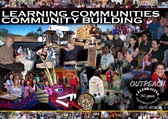Outreach Teacher Workshops Short Descriptions
Certificate in Outreach and Popular Education
1) Negotiated Learning: Derek Waddell
What really sets Outreach apart from other sections of TAFE is that we make the students the bosses, we actually negotiate what they want to learn and how and when and where, and whenever we do this effectively, the courses really work and great things happen.
This workshop will examine what negotiated learning really means, why it is so crucial to the success of our courses, and how to implement it in a range of different contexts and situations, from a totally open program for Older People to negotiating within the parameters of accredited TAFE courses.
2) Collective Learning: Rick Flowers
Is there a difference between strengthening individuals and strengthening communities? Individuals may attend courses and gain more confidence, form more social networks, strengthen their resolve for continual self-improvement.
Some people argue that the impact of these changes will ‘trickle down’ to strengthen and change others… and that, so the logic goes, strengthens communities.
But does education for more individuals in the community necessarily strengthen a community? Perhaps there is another dimension to community strengthening where there is more focus placed on collective rather than individual capacity to bring about change. Capacities that may contribute to collective effort might include:
Ahh, you say... this sounds good but how do you do it? I will lead a number of exercises and talk about theories of popular education which will help you plan and facilitate collective learning.
3) Keeping Access and Equity Alive in Vocational Education: Barbara Bee.
It’s difficult for Outreachers not to lose heart sometimes in face of the prevailing emphasis on only vocational outcomes in many VET programs.
The broader educational concerns can be underplayed or lost entirely.
This workshop will highlight how one Outreach Course aimed to do both, as well as making links with principles of popular education and community strengthening.
The workshop will take you step by step through the planning of the program, as well as documenting first responses by students to the topic of ageing.
It will illustrate how vocational skills’ training can be practised and demonstrated, but equally important, will be the consideration of inculcating in students a critical, reflective attitude to working with older people.
4) Teaching in & With Your Community: Camilla Couch, Anne Bicer and Liz Mackie
TAFE and its Outreach program have a particular role to play in promoting greater equity in education and life opportunities. The educational theory and practice underpinning Outreach has remained constant since Outreach was initiated and this workshop will reflect on the philosophy behind the Program and discuss such questions as:
Social justice involves freedom and freedom involves being able to make choices. In this workshop we will look at how we can help ourselves and others recognise that we do have choices, at how we can learn to make good choices, and at how we can resist others who want to make choices for us. We will look at the idea of freedom and at how we can help ourselves and others have a say in both its definition and practice. We will look at various forms of community and political action open to us, and try to grapple with the challenge of acting justly, that is, in ways which express our own freedom but do not restrict the freedom of others. The workshop will be constructed around discussion and a number of exercises.
1) Negotiated Learning: Derek Waddell
What really sets Outreach apart from other sections of TAFE is that we make the students the bosses, we actually negotiate what they want to learn and how and when and where, and whenever we do this effectively, the courses really work and great things happen.
This workshop will examine what negotiated learning really means, why it is so crucial to the success of our courses, and how to implement it in a range of different contexts and situations, from a totally open program for Older People to negotiating within the parameters of accredited TAFE courses.
2) Collective Learning: Rick Flowers
Is there a difference between strengthening individuals and strengthening communities? Individuals may attend courses and gain more confidence, form more social networks, strengthen their resolve for continual self-improvement.
Some people argue that the impact of these changes will ‘trickle down’ to strengthen and change others… and that, so the logic goes, strengthens communities.
But does education for more individuals in the community necessarily strengthen a community? Perhaps there is another dimension to community strengthening where there is more focus placed on collective rather than individual capacity to bring about change. Capacities that may contribute to collective effort might include:
- more capacity to speak out, engage in debate,
- foster debate, plan new initiatives,
- recruit others, raise awareness,
- organise groups, lobby,
- pose questions about the quality of life and help people find answers to those questions,
- facilitate collective decision making, protest,
- recognise structural disadvantage.
Ahh, you say... this sounds good but how do you do it? I will lead a number of exercises and talk about theories of popular education which will help you plan and facilitate collective learning.
3) Keeping Access and Equity Alive in Vocational Education: Barbara Bee.
It’s difficult for Outreachers not to lose heart sometimes in face of the prevailing emphasis on only vocational outcomes in many VET programs.
The broader educational concerns can be underplayed or lost entirely.
This workshop will highlight how one Outreach Course aimed to do both, as well as making links with principles of popular education and community strengthening.
The workshop will take you step by step through the planning of the program, as well as documenting first responses by students to the topic of ageing.
It will illustrate how vocational skills’ training can be practised and demonstrated, but equally important, will be the consideration of inculcating in students a critical, reflective attitude to working with older people.
4) Teaching in & With Your Community: Camilla Couch, Anne Bicer and Liz Mackie
TAFE and its Outreach program have a particular role to play in promoting greater equity in education and life opportunities. The educational theory and practice underpinning Outreach has remained constant since Outreach was initiated and this workshop will reflect on the philosophy behind the Program and discuss such questions as:
- Why is the Outreach process so successful?
- What are the variables involved in the success and sustainability of Outreach programs?
- What is the role of the Outreach teacher/coordinator?
- How does Outreach position itself in TAFE and in the community?
Social justice involves freedom and freedom involves being able to make choices. In this workshop we will look at how we can help ourselves and others recognise that we do have choices, at how we can learn to make good choices, and at how we can resist others who want to make choices for us. We will look at the idea of freedom and at how we can help ourselves and others have a say in both its definition and practice. We will look at various forms of community and political action open to us, and try to grapple with the challenge of acting justly, that is, in ways which express our own freedom but do not restrict the freedom of others. The workshop will be constructed around discussion and a number of exercises.

















